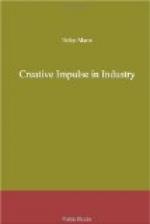The workshop would be devoted to the production of some marketable article or articles which are simple in construction. The selection of the product would not depend upon technical processes of construction to furnish educational subject matter. Educationally speaking, the acquisition of technique is a factor, but not a primary one, in the modern scheme of production. The primary factors are those which have universal significance, that is which are common to all industry, the relation of labor, of mechanical equipment, of raw material, of the finished product to the whole and to each other; the relation of the market to productive effort and an effective organization of all of these.
The technical processes or their acquisition are of educational value, because they furnish the necessary experience for the evaluation and appreciation of workmanship; or would furnish a basis for such a valuation if the educational factors which are common to all industry were matters in which all the workers participated and were matters which they understood. It may be that there are certain mechanical processes which have universal technical significance and on that account would have special educational value, but even if those processes were determined and selected for industrial instruction and acquisition, it would not imply that those who acquired them were industrially educated. They would be industrially equipped to act as efficient factory attachments, but the acquisition of processes, even the fundamental ones we have had ample opportunity to discover, do not inspire creative interests and desires.
Because educational content in modern factory work is not accessible to the mass of workers, we have fostered the illusion that the educational subject matter of industry was inherent in the technical process of fabrication. As we have fostered this illusion, we have missed the educational principle applicable to the craft period, as well as to the present, that the condition of the educational requirement, is that workers’ participation in productive enterprise coincide in the long run with creative intention and accomplishment. This central requirement of industrial education means that individuals learn to function with conscious creative intention in the environment in which they live and that their learning furnishes a basis for critical and informed evaluations in industrial activity. In the craft period the creative intention required the worker’s mastery over every process of his craft. In this machine age of associated enterprise the creative intention requires the ability to associate with others in the administration of industry as well as to take the place of an individual in the routine of factory work
For the reasons I have just stated the educational experiments I am suggesting could cover advantageously one of the many industries which are generally classed as unskilled, and almost any one of these unskilled routine industries would serve as well as another. Almost any one of the so-called child labor industries could be made over into opportunities for young people to experience the stimulating effect of associating with others in a productive effort, and gain the impetus which the stimulation supplied to pursue their subject matter far afield in general mechanics, science, economics, geography, history and art.




